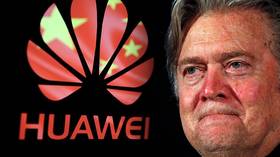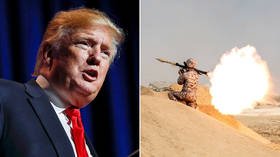‘Shutting down’ Huawei ‘10 times more important’ than trade deal with China – Bannon

Donald Trump’s former chief strategist Steve Bannon gave an impassioned account of what is driving the US war on Chinese tech firm Huawei… and trade has little to do with it. The US wants to destroy its competitor, for good.
Bannon, often credited with putting Trump in the White House, said that driving Huawei out of the US and Europe is far more critical than any trade deal with Beijing, the South China Morning Post reported on Wednesday.
The executive order is 10 times more important than walking away from the trade deal. It [Huawei] is a major national security threat, not just to the US but to the rest of the world. We are going to shut it down.
Taking a page from the administration’s playbook (which he admittedly helped to create), he called Huawei “a massive national security issue” and “a threat,” but failed to provide any kind evidence.
Earlier in the month, Washington placed Huawei and its affiliates on a trade blacklist which will make it harder for the firm to access US parts and components. Google, following suit, later suspended its licenses and product-sharing agreements with the Chinese telecom company, effectively shutting Huawei out of its services including the Google Play store.
Alleged security concerns and fear of the phones serving as spy devices for Beijing have been promoted by the US, who claim that Huawei has links to China’s ruling Communist Party. Both Huawei and the Chinese government have challenged this claim, but Washington has stuck to its guns despite lack of evidence.
Not only has the US government pushed the private sphere into meeting its demands, now it wants Europe to ban the company as well. So far, however, most of Washington’s allies remain unfazed. The UK and Germany both said that there isn’t sufficient evidence to suspect Huawei of any wrongdoing.
Regardless of the reasons the US provides for putting the mobile giant on its blacklist, at least some of their real motivations are clear. Huawei is one of China's most advanced tech companies and the world’s leading pioneer of upcoming 5G technology. As US firms struggle to compete with their Chinese counterparts, some say the US is taking extra-market action to try to even the playing field… something Trump has even hinted at himself.
Also on rt.com Huawei CEO says company’s own OS will run Android apps - reportsBannon’s threats went beyond Huawei. He called for Chinese companies to be restricted from accessing capital markets “until [they agree to] fundamental reform.” While his outlook of fundamentally clashing civilizations is often viewed as extreme, his comments are actually in keeping with Brendan Carr of the Federal Communications Commission, who said that companies that want access to US markets need to first prove they “share Western values.”
Like this story? Share it with a friend!














